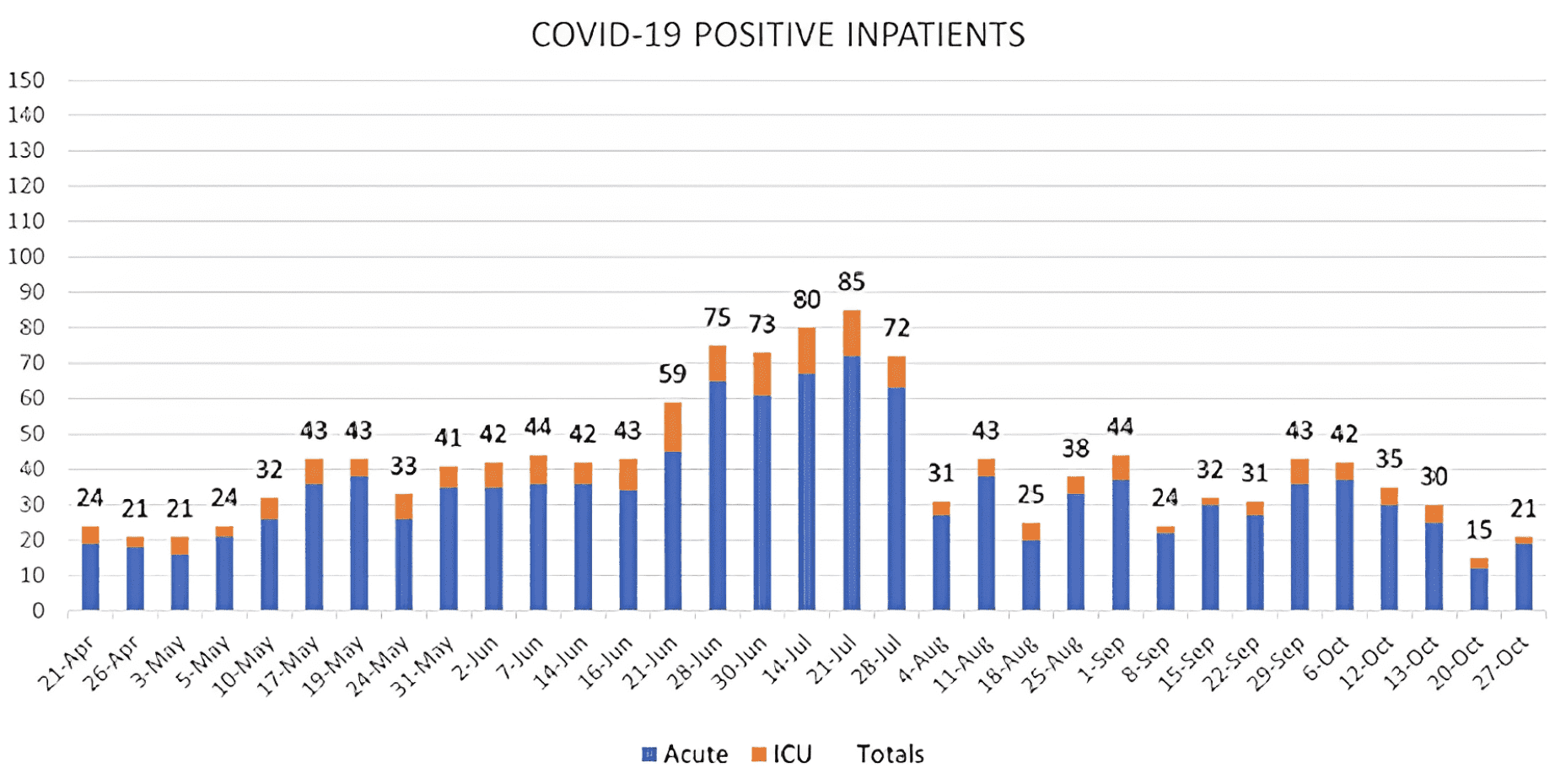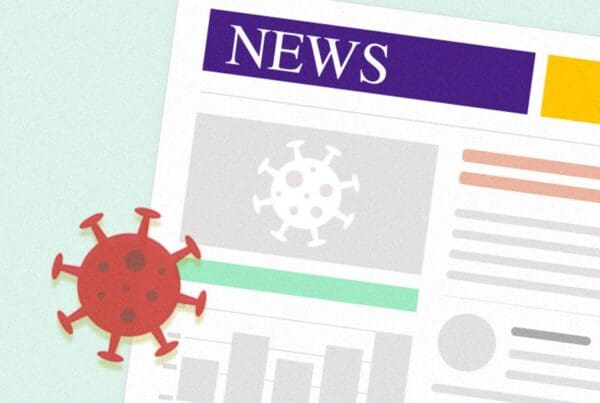Quick Read:
- Influenza and RSV have arrived earlier than usual and are driving a spike in respiratory virus activity.
- COVID-19 cases remain low, but new omicron subvariants are spreading in the U.S. and may pose a challenge in the weeks and months ahead.
- Two weeks remain to complete UW Medicine’s COVID-19 bivalent booster requirement; schedule your booster and flu shot today.
- Today marks the last day of operations for our COVID-19 test site at UWMC – Northwest, which opened more than two years ago as the first drive-through testing site in the country.
We typically see an uptick in respiratory viruses in late autumn, but this year has been different. Across the country, public health officials are reporting more activity earlier in the season even though cases of COVID-19 remain at comparatively low levels.
This concerning trend has been driven by the resurgence of viruses such as influenza and respiratory syncytial virus (RSV) that large portions of the population mostly avoided by isolating, distancing and masking during the past two years of the pandemic. This early surge, particularly in RSV, has especially impacted children. Our colleagues at Seattle Children’s, for instance, said this week that they are “seeing twice as many patients compared to a typical October,” and UW Medicine providers are likewise reporting an increasing number of children with upper respiratory tract infections. See: Is your child sick with RSV? Here’s how to tell. Older adults, immunocompromised people and people with other medical problems can be equally vulnerable.
If current trends hold and we experience another COVID-19 wave this winter, health systems nationwide, including UW Medicine, could be further strained by an even greater influx of patients suffering from respiratory illnesses in our clinics, emergency departments, urgent care sites and hospitals.
Fortunately, we have not yet seen a local resurgence of COVID-19. In fact, our COVID-19 community level in King County has been rated “low” for weeks, and the numbers have decreased even more in the past week. But new omicron subvariants, including BQ.1 and BQ.1.1, have recently emerged as potential threats for winter surges and now account for more than 16% of all COVID-19 infections nationally, according to the Centers for Disease Control and Prevention (CDC). This follows what we have seen throughout the pandemic with new strains of the virus emerging every three to six months. While vaccines and boosters should continue to provide significant protection against new variants, some of our most effective therapies for COVID-19, such as Evusheld and Bebtelovimab, may no longer work. These are challenges we will need to face as new scenarios present.
As healthcare professionals, the best thing we can do is lead by example and get the new booster along with the annual flu shot. These vaccines remain the best defenses we have for preventing serious illness, reducing transmission, and protecting ourselves and our loved ones.
Schedule Your Booster
UW Medicine clinical employees have two weeks remaining to complete the COVID-19 bivalent booster requirement. Appointments can be scheduled online at c19-vaccine.uwmedicine.org.
All others, including University of Washington employees, students, contractors or non-clinical employees in the School of Medicine, should schedule by calling 844.520.8700.
UW Medicine COVID-19 Activity Summary

Local/National/Global Epidemiology
King County: Public Health – Seattle & King County is reporting 523,2886 total cases and 3,257 deaths as of Oct. 27. The number of new positive tests over the past seven days is currently at 54.9 per 100,000 people.
Washington: The Department of Health reports 1,835,075 cases and 14,550 deaths as of Oct. 25.
United States: The Centers for Disease Control and Prevention reports 260,808 weekly cases, 97,063,357 total cases and 1,065,152 deaths as of Oct. 19.
Global: The WHO COVID-19 Dashboard reports 626,090,018 confirmed cases and 6,564,556 deaths as of Oct. 27.
COVID-19 State of Emergency Ending
Washington’s COVID-19 state of emergency officially ends on Monday, Oct. 31, but we do not expect this change to impact our operations. For now, we will continue to follow all current masking and vaccine requirements to ensure UW Medicine remains as safe as possible for our staff and patients.
Update on Acceptable COVID-19 Testing for Healthcare Workers
Anyone with symptoms of COVID-19, even mild ones, should get tested for infection. Recently updated CDC guidance now allows for using either one PCR test or two antigen tests separated by 48 hours.
PCR testing continues to be offered at multiple UW Medicine sites, and home antigen tests are available for free through Washington State Department of Health. If you have symptoms consistent with COVID-19 that are getting worse, including if your tests are negative, please contact your care provider or seek care at urgent care or the emergency department. UW Medicine policies for return to work after COVID-19 and for other respiratory illnesses are unchanged. It’s always a good reminder as we head into the cold and flu season to stay home with symptoms!
UWMC – Northwest COVID-19 Test Site Closing
Today marks the final day for our COVID-19 test site at UW Medical Center – Northwest. This site made history when it opened more than two and a half years ago as the first drive-through test site in the country. At the time, there were fewer than 100 confirmed COVID-19 cases in the Seattle area.
While the closing is bittersweet, we expect it to have minimal impact on testing. Our 14 other test sites, most of which are in King County, remain open and have plenty of availability. In addition, our test site on Aurora Avenue North is less than a mile away from UWMC – Northwest.
Still, this is a significant milestone that deserves acknowledgement. Special thanks to Dr. Seth Cohen, Jenny Brackett and the team members from nursing, security, facilities and lab medicine, who led the opening of that site and helped refine the drive-through test model that quickly became the preferred operational format for testing throughout the region.
Finally, a reminder of our Town Hall tomorrow, Oct. 28, at 3 p.m. We will discuss the latest developments, trends and issues impacting our community. Be sure to get your questions in early. We look forward to seeing you there.
Sincerely,
John Lynch, MD, MPH
Medical Director, Infection Prevention & Control
Associate Medical Director, Harborview Medical Center
Division of Allergy & Infectious Diseases, UW School of Medicine
